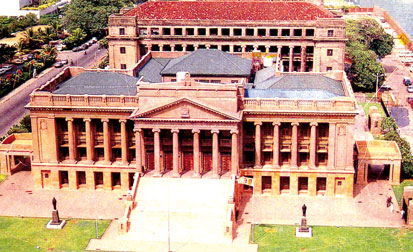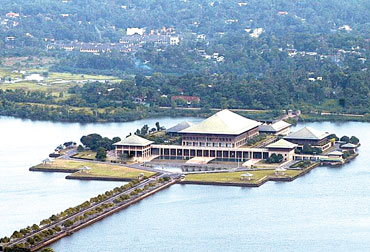Reminising debating skills and wit of parliamentarians of yore
bY Edward GUNAWARDENA
|

The old parliament at Galle Face

New parliamentary complex at Sri Jayewardenepura |
During the past two to three decades there has been a distinct
decline in the standards of behaviour of parliamentarians during
proceedings of the House. Seldom did debates reach the heights of
excellence that prevailed in the fifties, sixties and seventies. Obscene
and insulting words came to be traded across the floor. There were
fisticuffs too. School children who came in organised groups from rural
schools were on several occasions exposed to unruly behaviour. They
certainly carried away poor impressions of their legislators. The
country certainly longs for higher standards.
Intellectual speeches
The newly elected Parliament with so many young and academically and
professionally qualified members on both sides of the divide has
certainly kindled hopes of the re-emergence of an august assembly where
the language will be parliamentary, the debates interesting and lively
and the behaviour of members exemplary. Above all it is hoped that
camaraderie will prevail among all members. There can be no animosity in
professional politics.
As an official I have been a regular visitor to both Houses, the old
Parliament in the Fort and the present one. The homeliness of the old
premises, its compact interior, its location and most importantly the
peace that prevailed at the time certainly fostered better interaction
and friendship among the members. Often have I seen and even joined
members of the Government as well as the opposition at places such as
the Dominion Hotel, White Horse Inn or The Free China Hotel. The late
Bernard Soyza easily one of the best parliamentarians the country has
seen was a voracious reader. It was indeed a common sight to see him
ensconced in a throne-like cane chair in the lobby of the Taprobane
Hotel reading a book or magazine. This was in the early seventies when I
too visited the Taprobane Book Shop during the lunch interval. I was
then the Personal Assistant to the IGP.
Restrictions on parliamentary time due primarily to the war that
existed certainly affected the quality of debate. With minimum time
doled out to MP's for their speeches it is not possible to make well
researched contributions. Time restrictions have put MPs in straight
jackets and reduced them to the level of debaters in O'Level classes.
The new parliament will have to get out of this mentality, amend the
standing orders if necessary and make parliament functional for 24 hours
of the day. It is only then that there will be resurgence of
intellectual speeches, of thrust and parry and repartee, of wit and even
filibuster.
Debating skills and wit
Good public speaking and debating ability is seldom achieved without
conscious effort. In most countries the legislature consisting of the
representatives of the people is the apex chamber for discussion,
debate, deliberation and decision-making. Invariably the men and women
who stand out in these august bodies are people who had shown early
promise as debaters at school or university level. In the United Kingdom
for centuries leading lights of the Oxford Union have shone as
parliamentarians in later life. In Sri Lankan politics SWRD
Bandaranaike, Lalith Athulathmudali and Lakshman Kadirgamar had earlier
made their mark in the Oxford Union. Dudley Senanayake and Pieter
Keuneman had shown debating promise at Cambridge, NM at the London
School of Economics, and Philip Gunawardena at Wisconsin. Felix Dias
Bandaranaike honed his argumentative capabilities in the Law Faculty of
Peradeniya and the Ceylon Law College.
It is good for young parliamentarians to know that most men and women
who made their mark in politics were endowed not only with debating
skills but wit. In Britain wit came naturally to politicians mainly
because English literature is so rich in wit and humour. Perhaps there
is no British parliamentarian even today who has not read Johnson,
Chesterton, Bellock, Oscar Wilde, Bernard Shaw and Mark Twain.
Accomplished parliamentarians do not lose their temper when
embarrassing questions are asked, heckled or interrupted. They smile and
retort politely.
Benjamin Disraeli was at one time the Prime Minister of England and
the Leader of Opposition was Gladstone. Once when Disraeli was speaking,
an opposition member with the intention of annoying him had asked, "Mr.
Prime Minister can you explain the difference between calamity and
catastrophy? Disraeli had been using the two words several times. The
Prime Minister was speaking on a subject of national importance. He did
not show anger or annoyance. In a calm and collected manner he said,
"Mr. Speaker, if my friend Gladstone was walking by the Thames and if he
fell into the water it would be a calamity.
If someone jumped into the waters and saved him from drowning it
would be a catastrophe." There was laughter in the House and the man who
asked the question quietly walked out of the Chamber.
Lasting impression
The wit of Winston Churchill as a politician and parliamentarian
remains unsurpassed. He silenced those who interrupted or heckled him
with devastating wit.
He once said, "The characteristic of a great man is his power to
leave a lasting impression on people he meets." Churchill lived up to
this.
His life was not only long but it was full and varied - full of
friends and of enemies, full of action and creativity of argument and
ruthlessness." He was one of the greatest orators the world has seen. It
was the inspiring power of his speeches that kept morale and led the
allies to victory. In our thrust for victory against the LTTE we
certainly saw shades of Churchill in the inspiring speeches of our own
President.
On politics some of the observations of Churchill are worth
recalling. He once said, "The world today is ruled by harassed
politicians absorbed in getting to office, or turning out the other man.
So that not much room is left for debating great issues on their
merits." Asked what qualities a politician required Churchill had
replied, "The ability to foretell what is going to happen tomorrow, next
week, next month and next year. And to have the ability afterwards to
explain why it did not happen." He was also candid enough to say, "It
would be a great reform in politics if wisdom could be made to spread as
easily and as rapidly as folly."
One of Churchill's most famous speeches is that of June 1940. "We
shall fight on the beaches, we shall fight on the landing grounds, we
shall fight in the fields and in the streets, we shall fight in the
hills..."
It is said that as he paused in the great uproar that greeted these
words Churchill muttered to a colleague next to him, "And we'll fight
them with the butt ends, of broken beer bottles because that's all we've
got!"
To Churchill wit came naturally. At the Yalta meeting for the
formation of the UNO, while in the hotel with Stalin and Roosevelt, one
morning Roosevelt had gone in his wheel-chair and kicked open the
unlocked door of Churchill's room. Churchill was surprised.
He literally was caught with his pants down. When he saw his friend
he smiled broadly and said. "Come in. The Prime Minister of England has
nothing to hide from the President of the United States." It was in
Parliament that he was in his element. When a member once wanted to
speak on, Churchill quite nonchalantly had observed, "I can well
understand.
He needs the practice badly." A young MP once asked him how he could
have put more fire into the speech he had just made. Churchill's answer
had been, "what you should have done is to put the speech into the
fire."
Excellent speakers
Strangely, it was women MP's who dared to interrupt him in
parliament. Once a woman MP had blurted out, "Prime Minister, you are
drunk." Churchill who was after a couple of whiskies had smiled and
calmly retorted, "Lady, I am drunk. You are ugly... and I will be sober
in the morning." On another day a woman MP provoked by Churchill had
angrily pronounced, "Prime Minister, if I were your wife I'll put poison
into your coffee." Churchill's retort had been, "Oh dear, if you were my
wife, I'd take it." It will certainly be worthwhile for parliamentarians
young and old to read the prolific writings of Winston Churchill and
also what has been written about him, especially his devastating and
often wicked wit.
During the days of the 'Old parliament' Sri Lanka too had some
excellent speakers and debaters. These were men that we could justly be
proud of. Some of the names that readily come to mind are S. W. R. D.
Bandaranaike, N. M. Perera, Colvin R. de Silva, Pieter Keunemann, Dudley
Senanayake, G. G. Ponnambalam, V. N. Navaratnam, Sivasittamparam and
Felix Dias Bandaranaike.
They were men who could hold their audiences to rapt attention. Few
dared to interrupt them when they were on the floor. If and when it
happened we saw the best in them. Lost tempers and unparliamentary
language, never. In the fifties, SWRD who had crossed over to the
opposition was criticizing a particular Ministry when a member
interrupted to say, "the Hon. Minister is sleeping", without batting an
eyelid Bandaranaike quipped, "let lying dogs sleep." In 1966 as an Asst.
Supdt. of Police I headed the VIP Security Division. There were only two
people considered VIPs, the Prime Minister and the Governor General.
Invariably I accompanied the Prime Minister, Dudley Senanayake to
Parliament. Usually I followed proceedings from the officials box or the
Speaker's Gallery.
One day there was a heated debate. I believe it had something to do
with the Dudley - Chelvanayagam pact. When the Prime Minister was
speaking the atmosphere in the House was tense. But quite unexpectedly
he was interrupted. The interruption came from none other than
Maithripala Senanayake.
The Prime Minister was not ruffled. He sent the House to laughter
when with a guffaw he said, "The Hon. Member for Medawachchiya is
Sinhala by day and Tamil by night." That was the time when Maithripala
Senanayake was courting Ranji Handy. Later in the day Dudley and
Maithripala were seen having tea at the members canteen seated at the
same table. They were both large hearted gentlemen that bestrode Sri
Lankas political scene for several decades.
The effect
Some may argue that there was such repartee in debate in the House by
the Galle Face Green because the proceedings were mainly in English.
This is certainly not so. Without descending to obscenity the Sinhala
language can be used to devastating effect. Most of the quips that I
have cited above could have been put across even more effectively by
accomplished Sinhala speakers.
Dr. Colvin R. de Silva was an excellent speaker in English as well as
Sinhala. Sometime in the seventies he was making a speech in Sinhala
when an incorrigible heckler interrupted him.
The latter was Molligoda the MP for Nivithigala. He was my friend and
contemporary at Peradeniya in the fifties. A light hearted fellow, we
called him "Molli." He turned to the Speaker, smiling all the time and
in measured tones said: "Garu Kathanayaka Thumani!, Eka molliyak thiyana
sathata kiyana nama api okkoma dannawa. Namuth, molli godak thiyana
sathekuta kiyanne mokaada kiyala mamanam danne ne"! Molli was more
guarded thereafter. |

